现在完成时讲解(含讲解及习题)
现在完成时态讲解和练习

现在完成时态讲解及练习一、现在完成时的构成肯定句:主语+have/ has + done (过去分词)+其它He has lived in Shenzhen for 4 years.一般疑问句:Have/ Has +主语+ done (过去分词)+其它Has he lived in Shenzhen for 4 years?否认句: 主语+have/ has+ not + done (过去分词)+其它He has not finished his homework.过去分词的构成方法如下 :1.一般情况下,直接在动词原形后面加 –ed.work---worked answer---answered obey---obeyed want---wanted 2.以不发音的 -e 结尾的动词只加 –d.Move---moved hope---hoped divide---divided 3.字尾是辅音+y 的动词。
那么将y 改i 加ed. study---studied tidy---tidied satisfy---satisfied4.以重读闭音节结尾的词,这些词的末尾只有一个辅音字母时,双写这个辅音字母,再加 –ed. stop---stopped regret--- regretted drop---dropped不规那么动词过去式与过去分词分类记忆表一、AAA. 〔原形,过去式和过去分词一致〕二、ABB 〔过去式和过去分词一致〕3) 过去式、过去分词-t 替换原形-d6) 过去式、过去分词改为-elt二、现在完成时标志词:recently; recent years; these days/ years; lately; since; for+时间段;in the past few years; ever since; in the last five months; up to now; since then; so far; ever; never, yet; once; twice; already; before; just already (已经): 用于肯定句I have already posted the letter .yet(已经): 用于否认句,疑问句He hasn’t done his homework yet.just(刚刚)They have just left.ever(曾经)Have you ever been to Beijing ?never(从不)I have never seen him .before(以前)Have you seen the film before?since(自从…以来)I’ve worked in the school si nce 1999.for(长达)He’s lived in Shenzhen for 6 years.in the past several days / weeks/ years(在过去的…)recently(最近)I have not written to my parents recently.so far(到目前为止)So far she has learned 5 English songs.up to now(到目前为止)this morning/month/year(今天早上/这个月/今年)三、现在完成时的用法1)现在完成时表示过去发生的动作,并对现在有影响。
现在完成时与现在完成进行时态讲解及练习(含答案)
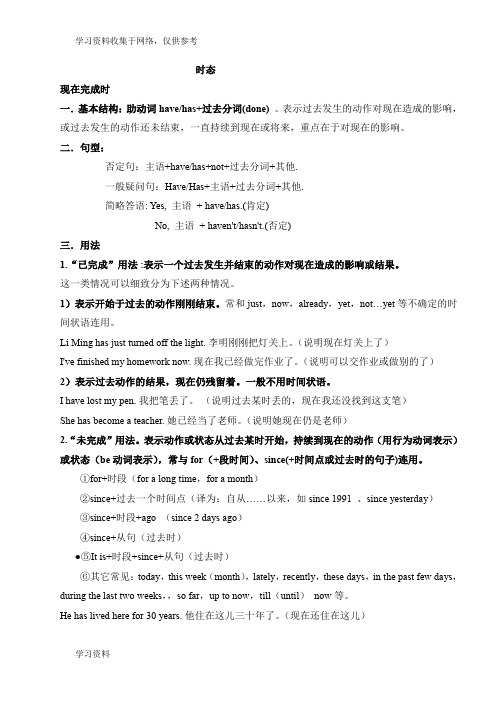
时态现在完成时一.基本结构:助动词have/has+过去分词(done) 。
表示过去发生的动作对现在造成的影响,或过去发生的动作还未结束,一直持续到现在或将来,重点在于对现在的影响。
二.句型:否定句:主语+have/has+not+过去分词+其他.一般疑问句:Have/Has+主语+过去分词+其他.简略答语: Yes, 主语+ have/has.(肯定)No, 主语+ haven't/hasn't.(否定)三.用法1.“已完成”用法 :表示一个过去发生并结束的动作对现在造成的影响或结果。
这一类情况可以细致分为下述两种情况。
1)表示开始于过去的动作刚刚结束。
常和just,now,already,yet,not…yet等不确定的时间状语连用。
Li Ming has just turned off the light. 李明刚刚把灯关上。
(说明现在灯关上了)I've finished my homework now. 现在我已经做完作业了。
(说明可以交作业或做别的了)2)表示过去动作的结果,现在仍残留着。
一般不用时间状语。
I have lost my pen. 我把笔丢了。
(说明过去某时丢的,现在我还没找到这支笔)She has become a teacher. 她已经当了老师。
(说明她现在仍是老师)2.“未完成”用法。
表示动作或状态从过去某时开始,持续到现在的动作(用行为动词表示)或状态(be动词表示),常与for(+段时间)、since(+时间点或过去时的句子)连用。
①for+时段(for a long time,for a month)②since+过去一个时间点(译为:自从……以来,如since 1991 、since yesterday)③since+时段+ago (since 2 days ago)④since+从句(过去时)●⑤It is+时段+since+从句(过去时)⑥其它常见:today,this week(month),lately,recently,these days,in the past few days,during the last two weeks,,so far,up to now,till(until)now等。
【英语】英语现在完成时解题技巧讲解及练习题(含答案)含解析
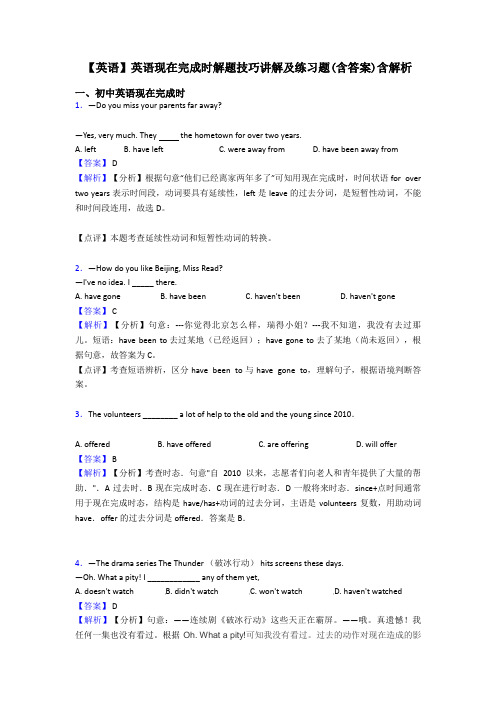
【英语】英语现在完成时解题技巧讲解及练习题(含答案)含解析一、初中英语现在完成时1.—Do you miss your parents far away?—Yes, very much. They the hometown for over two years.A. leftB. have leftC. were away fromD. have been away from【答案】 D【解析】【分析】根据句意“他们已经离家两年多了”可知用现在完成时,时间状语for over two years 表示时间段,动词要具有延续性,left是 leave的过去分词,是短暂性动词,不能和时间段连用,故选D。
【点评】本题考查延续性动词和短暂性动词的转换。
2.—How do you like Beijing, Miss Read?—I've no idea. I _____ there.A. have goneB. have beenC. haven't beenD. haven't gone【答案】 C【解析】【分析】句意:---你觉得北京怎么样,瑞得小姐?---我不知道,我没有去过那儿。
短语:have been to去过某地(已经返回);have gone to去了某地(尚未返回),根据句意,故答案为C。
【点评】考查短语辨析,区分have been to与have gone to,理解句子,根据语境判断答案。
3.The volunteers ________ a lot of help to the old and the young since 2010.A. offeredB. have offeredC. are offeringD. will offer【答案】 B【解析】【分析】考查时态.句意"自2010以来,志愿者们向老人和青年提供了大量的帮助.".A过去时.B现在完成时态.C现在进行时态.D一般将来时态.since+点时间通常用于现在完成时态,结构是have/has+动词的过去分词,主语是volunteers复数,用助动词have.offer的过去分词是offered.答案是B.4.—The drama series The Thunder (破冰行动) hits screens these days.—Oh. What a pity! I ____________ any of them yet,A. doesn't watchB. didn't watchC. won't watchD. haven't watched【答案】 D【解析】【分析】句意:——连续剧《破冰行动》这些天正在霸屏。
现在完成时讲解和习题
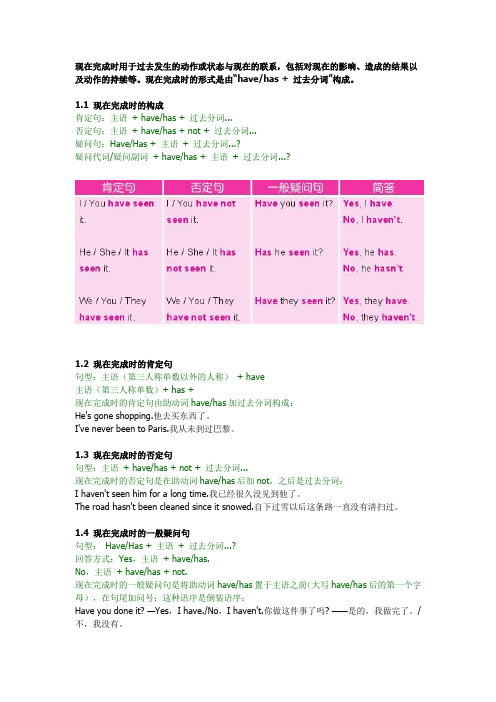
现在完成时用于过去发生的动作或状态与现在的联系,包括对现在的影响、造成的结果以及动作的持续等。
现在完成时的形式是由“have/has + 过去分词”构成。
1.1 现在完成时的构成肯定句:主语+ have/has + 过去分词...否定句:主语+ have/has + not + 过去分词...疑问句:Have/Has + 主语+ 过去分词...?疑问代词/疑问副词+ have/has + 主语+ 过去分词...?1.2 现在完成时的肯定句句型:主语(第三人称单数以外的人称)+ have主语(第三人称单数)+ has +现在完成时的肯定句由助动词have/has加过去分词构成:He's gone shopping.他去买东西了。
I've never been to Paris.我从未到过巴黎。
1.3 现在完成时的否定句句型:主语+ have/has + not + 过去分词...现在完成时的否定句是在助动词have/has后加not,之后是过去分词:I haven't seen him for a long time.我已经很久没见到他了。
The road hasn't been cleaned since it snowed.自下过雪以后这条路一直没有清扫过。
1.4 现在完成时的一般疑问句句型:Have/Has + 主语+ 过去分词...?回答方式:Yes,主语+ have/has.No,主语+ have/has + not.现在完成时的一般疑问句是将助动词have/has置于主语之前(大写have/has后的第一个字母),在句尾加问号;这种语序是倒装语序:Have you done it? —Yes,I have./No,I haven't.你做这件事了吗? ——是的,我做完了。
/不,我没有。
Have you ever been to India? —Yes,I have./No,I haven't.你去过印度吗? ——是的,我去过。
(完整版)现在完成时讲解(含讲解及习题)(可编辑修改word版)
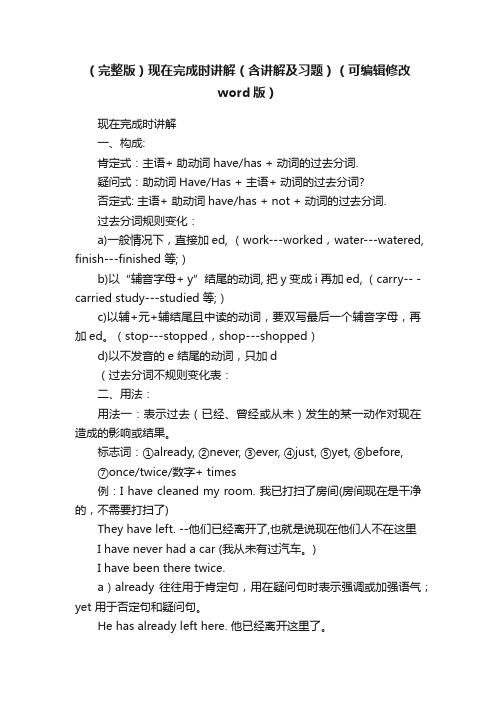
(完整版)现在完成时讲解(含讲解及习题)(可编辑修改word版)现在完成时讲解一、构成:肯定式:主语+ 助动词have/has + 动词的过去分词.疑问式:助动词Have/Has + 主语+ 动词的过去分词?否定式: 主语+ 助动词have/has + not + 动词的过去分词.过去分词规则变化:a)一般情况下,直接加ed, (work---worked,water---watered, finish---finished 等;)b)以“辅音字母+ y”结尾的动词, 把y 变成i 再加ed, (carry-- -carried study---studied 等;)c)以辅+元+辅结尾且中读的动词,要双写最后一个辅音字母,再加ed。
(stop---stopped,shop---shopped)d)以不发音的e 结尾的动词,只加d(过去分词不规则变化表:二、用法:用法一:表示过去(已经、曾经或从未)发生的某一动作对现在造成的影响或结果。
标志词:①already, ②never, ③ever, ④just, ⑤yet, ⑥before,⑦once/twice/数字+ times例:I have cleaned my room. 我已打扫了房间(房间现在是干净的,不需要打扫了)They have left. --他们已经离开了,也就是说现在他们人不在这里I have never had a car (我从未有过汽车。
)I have been there twice.a)already 往往用于肯定句,用在疑问句时表示强调或加强语气;yet 用于否定句和疑问句。
He has already left here. 他已经离开这里了。
Has he already left here? 他(真的)已经离开这里了吗?(表示加强语气)My teachers haven’t had breakfast yet. 我的老师们还没有吃早饭。
现在完成时语法详细讲解

肯定、疑问、否定肯定句还疑问句、否定最近肯定、否定、疑问句几次用法一:表示过去发生或已经完成的某一动作对现在造成的影响或结果。
常与just(刚刚),already(已经),never(从来没有),ever(曾经),before(以前),yet(仍然),once(一次),twice(两次),many times (很多次),how many times(多少次),so far(迄今为止),during the past(last)three years(最近三年来)等连用。
※副词的位置:①just常用于肯定句中,放在have / has后,He has just come .②never表示否定, 放在have / has后, He has never visited the Great Wall.③ever用于疑问句中,句型为: Have / Has+主语+ever +过去分词?“…曾经……过吗?”用于询问某人过去的经历。
Have you ever been to the farm?④before用于句末,The woman has never heard of that before.⑤yet 用于句末或not 之后.Has the train arrived yet? No, not yet.⑥already用于肯定句, have / has 之后或句末.We have already finished it.⑦so far用于句首或句末. So far, we have visited the moon.用法二:表示过去已经开始,一直延续到现在的动作或状态。
时间状语有:①for+表示一段时间的词语I have taught English for 19 years。
②since+表示过去时间点的词语He has been at this school since 1986.③since+表示过去的时间状语从句I have lived here since I was born.2 ④since+一段时间+ago. I have known him since 20 years ago.三、现在完成时态中可以和表示一段时间状语(for,since,how long, all one’s life)连用的动词必须是表示延续的情况或动作的动词,即延续性动词。
现在完成时专项讲解及练习

时态专题之现在完成时第一部分:现在完成时概述现在完成时的结构:现在完成时的结构是“ have / has+ 动词的过去分词”。
过去分词的变化分规则与不规则两种。
规则变化与过去式相同,不规则变化需要另记。
现在完成时的用法:1)过去发生或已经完成的动作或存在的状态对现在造成的影响或结果。
(即它的"完成用法")e.g. I have just cleaned the classroom.2)过去已经开始,一直持续到现在的动作或状态。
注意:此时动作可能还要继续。
(即它的"未完成用法")。
E.g. He has lived in Beijing for ten years.现在完成时的句型变换A. 现在完成时的否定句是在have / has后边加not,变一般疑问句是把have / has提前。
E.g. I have ridden a horse.I have not ridden a horse.Have you ridden a horse?B.现在完成时的时间状语通常为already, just, yet, ever, never, before等。
另外还可和since+表过去的时间点,for+时间段连用。
做题时常见错误如下:一、易丢掉have / has例:He taken (take) the medicine before.Correction:________________解析:have/has 为助动词,起构成时态的作用,是不能省略的。
二、have与has易用混例:I has never heard (hear) of that before.Correction:________________解析:现在完成时与一般现在时一样也有单三人称的变化,当单三人称作主语时用has, 一般人称作主语时用have.三、延续性动词与短暂性动词易弄错例:She has left (离开) for 2 hours.Correction:________________解析:在肯定句中,与since或for引出的时间状语连用的是延续性动词,不能是短暂性动词,但在否定句中短暂性动词也是可以的。
现在完成时态讲解及练习
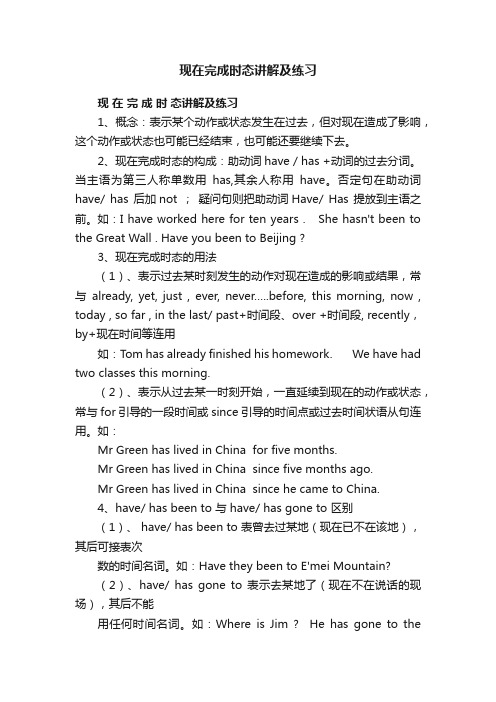
现在完成时态讲解及练习现在完成时态讲解及练习1、概念:表示某个动作或状态发生在过去,但对现在造成了影响,这个动作或状态也可能已经结束,也可能还要继续下去。
2、现在完成时态的构成:助动词have / has +动词的过去分词。
当主语为第三人称单数用has,其余人称用have。
否定句在助动词have/ has 后加not ;疑问句则把助动词Have/ Has 提放到主语之前。
如:I have worked here for ten years . She hasn't been to the Great Wall . Have you been to Beijing ?3、现在完成时态的用法(1)、表示过去某时刻发生的动作对现在造成的影响或结果,常与already, yet, just , ever, never…..before, this morning, now , today , so far , in the last/ past+时间段、over +时间段, recently,by+现在时间等连用如:Tom has already finished his homework. We have had two classes this morning.(2)、表示从过去某一时刻开始,一直延续到现在的动作或状态,常与for 引导的一段时间或since 引导的时间点或过去时间状语从句连用。
如:Mr Green has lived in China for five months.Mr Green has lived in China since five months ago.Mr Green has lived in China since he came to China.4、have/ has been to 与 have/ has gone to 区别(1)、 have/ has been to 表曾去过某地(现在已不在该地),其后可接表次数的时间名词。
现在完成时及现在完成进行时讲解及练习
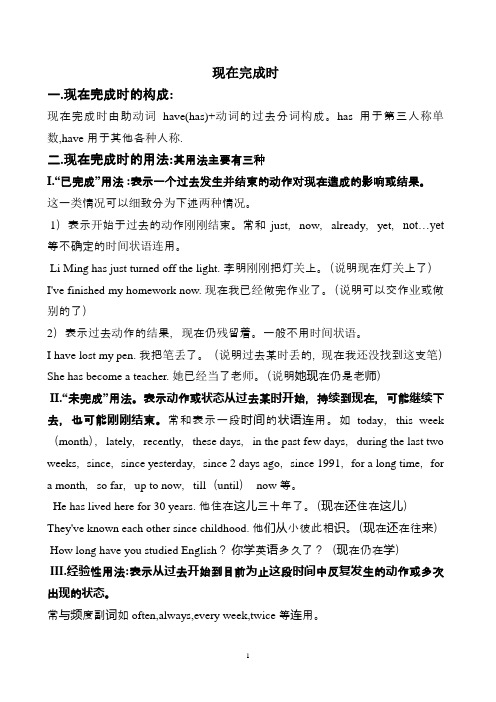
现在完成时一.现在完成时的构成:现在完成时由助动词have(has)+动词的过去分词构成。
has用于第三人称单数,have用于其他各种人称.二.现在完成时的用法:其用法主要有三种I.“已完成”用法 :表示一个过去发生并结束的动作对现在造成的影响或结果。
这一类情况可以细致分为下述两种情况。
1)表示开始于过去的动作刚刚结束。
常和just,now,already,yet,not…yet 等不确定的时间状语连用。
Li Ming has just turned off the light. 李明刚刚把灯关上。
(说明现在灯关上了)I've finished my homework now. 现在我已经做完作业了。
(说明可以交作业或做别的了)2)表示过去动作的结果,现在仍残留着。
一般不用时间状语。
I have lost my pen. 我把笔丢了。
(说明过去某时丢的,现在我还没找到这支笔)She has become a teacher. 她已经当了老师。
(说明她现在仍是老师)II.“未完成”用法。
表示动作或状态从过去某时开始,持续到现在,可能继续下去,也可能刚刚结束。
常和表示一段时间的状语连用。
如today,this week (month),lately,recently,these days,in the past few days,during the last two weeks,since,since yesterday,since 2 days ago,since 1991,for a long time,for a month,so far,up to now,till(until)now等。
He has lived here for 30 years. 他住在这儿三十年了。
(现在还住在这儿)They've known each other since childhood. 他们从小彼此相识。
(完整版)现在完成时讲解与习题

现在完成时讲解与习题1.概念⑴表示过去发生的动作对现在的影响和结果依然存在(已完成)。
常与副词already(肯定),yet(否定,疑问),just,ever,never,once,twice,befoe等连用。
如: We have already known each other.I have just washed my face.He has been to this island before.⑵也表示过去发生的动作或状态一直持续到现在,且有可能继续下去(未完成)。
常与for(+时间段),since(+时间点或过去时的句子),so far等表示一段时间的状语连用。
如:如: We have lived there since 2000.Mr.zhang has been in Beijing for over thirty years.He has learned English since he was 6 years old.注:这种用法中的动词用延续性动词。
非延续性动词要用延续性动词代替。
常见非延续性动词与延续性动词的转换:buy—have borrow—keep come—be here leave/go—be away begin/start—be on die—be dead join—be in如:I have kept(borrow) the book for two weeks.She has had(buy) this bike for a year.The old man has been dead(die) since last year.They have been away(leave) for two hours.2.句型结构⑴肯定句:主语 + have/has + 动词过去分词 + 其他。
(主语是第三人称单数时用has,其他人称用have)。
如:I have done my homework since 6:00.They have found the lost boy.She has gone to Beijing since she was 16 years old.⑵否定句:主语 + have/has + not + 动词过去分词 + 其他。
现在完成时讲解及练习(答案)

现在完成时讲解及练习(答案)初中英语主要时态系列(六)——现在完成时讲解及练习1现在完成时的基本结构肯定句:主语+have/has+动词的过去分词+其他否定句:主语+have/has+not+动词的过去分词+其他⼀般疑问句:Have/Has+主语+动词的过去分词+其他特殊疑问句:特殊疑问词+⼀般疑问句(have/has+主语+过去分词+其他)2现在完成时的⽤法1. 现在完成时⽤来表⽰过去已经完成的动作对现在造成影响或后果。
也就是说,动作或状态发⽣在过去但它的影响现在还存在,强调的是现在。
I have already posted the photo.我已经邮寄出了照⽚。
与此种⽤法连⽤的时间状语时⼀些模糊的过去时间状语,如already(肯定句句中), yet(否定句/疑问句句尾), just, before, recently,still, lately,never 等。
2. 现在完成时也可⽤来表⽰动作或状态发⽣在过去某⼀时刻,持续到现在并且有可能会继续持续下去。
He has lived here since 1978.⾃从1978年以来,他⼀直住在这⼉。
(动作起始于1978年,⼀直住到现在,可能还要继续住下去。
)此种⽤法常与for(+时间段),since(+时间点或过去时的句⼦)连⽤。
谓语动词必须是延续性动词。
有些瞬间动词可变为延续动词:go out----be out finish----be over open----be open die----be dead buy---have fall ill---be ill come back----be back catch a cold----have a cold3现在完成时常见考法对于现在完成时的考查,多以单选、句型转换或词语运⽤的形式考查学⽣在具体语境中灵活运⽤时态的能⼒。
在考试中,会让⼤家判断是否该⽤现在完成时,或者是考查“瞬间动词”不能与表⽰⼀段时间的状语连⽤”这⼀知识点。
(完整版)现在完成时讲解及练习题及答案
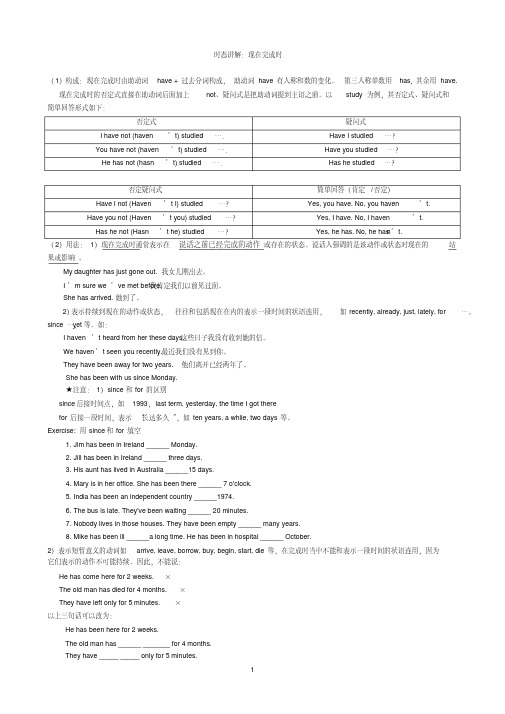
时态讲解:现在完成时(1)构成:现在完成时由助动词have + 过去分词构成,助动词have 有人称和数的变化。
第三人称单数用has,其余用have.现在完成时的否定式直接在助动词后面加上not、疑问式是把助动词提到主语之前。
以study 为例,其否定式、疑问式和简单回答形式如下:否定式疑问式I have not (haven’t) studied….Have I studied…?You have not (haven’t) studied….Have you studied…?He has not (hasn’t) studied….Has he studied…?否定疑问式简单回答(肯定/否定)Have I not (Haven’t I) studied…?Yes, you have. No, you haven’t.Have you not (Haven’t you) studied…?Yes, I have. No, I haven’t.Has he not (Hasn’t he) studied…?Yes, he has. No, he has n’t.(2)用法:1)现在完成时通常表示在说话之前已经完成的动作或存在的状态。
说话人强调的是该动作或状态对现在的结果或影响。
My daughter has just gone out. 我女儿刚出去。
我肯定我们以前见过面。
I’m sure we’ve met before.She has arrived. 她到了。
2)表示持续到现在的动作或状态,往往和包括现在在内的表示一段时间的状语连用,如recently, already, just, lately, for…, since…,yet等。
如:I haven’t heard from her these days. 这些日子我没有收到她的信。
We haven’t seen you recently. 最近我们没有见到你。
现在完成时语法详细讲解

英语现在完成时语法详细讲解与配套习题一、现在完成时用来表示之前已发生或完成的动作或状态,但它的影响现在还存在;也可表示持续到现在的动作或状态。
其构成:have (has) + 过去分词。
规则变化的过去分词与过去式的变化一样,在动词词尾加ed;不规则变化的过去分词见不规则动词表,需要同学记忆。
现以see the film 为例将现在完成时的肯定句,否定句和疑问句列表如下:肯定句:I/You/We/They have seen the film. He/She /It has seen the film.否定句:I/You/We/They have not/ haven ' t seen the film.He/ She/It has not/hasn ' t seen the film.疑问句: Have I/you/they seen the film Yes, you/ we/I/they have. No, you/ we/I/they haven ' t.Has he/she/it seen the film Yes, he/ she/ it has. No, he/ s he/ it hasn ' t.用法一:表示过去发生或已经完成的某一动作对现在造成的影响或结果。
常与just (刚刚),already (已经),never (从来没有),ever (曾经),before (以前),yet (仍然),once (一次),twice (两次),many times (很多次), how many times (多少次), so far (迄今为止), during the past (last ) three years (最近三年来)等连用。
X 副词的位置:①just常用于肯定句中,放在have / has 后,He has just come .②never 表示否定,放在have / has 后,He has never visited the Great Wall.③ever用于疑问句中,句型为:Have / Has +主语+ ever +过去分词”…曾经 ........................................ 过吗”用于询问某人过去的经历。
现在完成时态的讲解和练习题(6月5日)
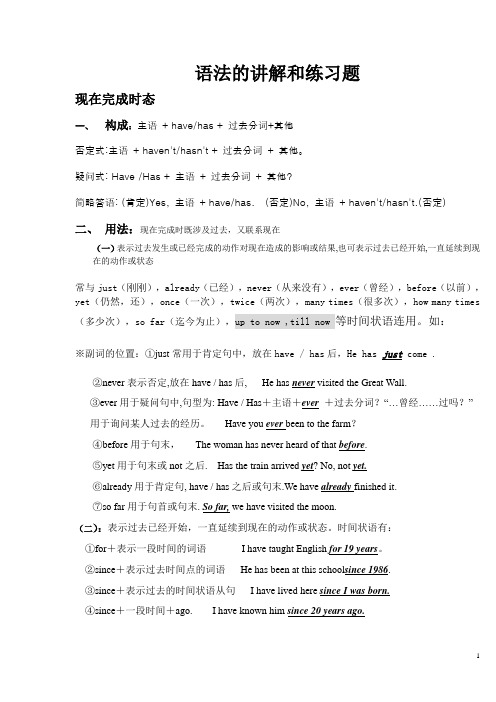
语法的讲解和练习题现在完成时态一、构成:主语+ have/has + 过去分词+其他否定式:主语+ haven't/hasn't + 过去分词+ 其他。
疑问式: Have /Has + 主语+ 过去分词+ 其他?简略答语: (肯定)Yes, 主语+ have/has. (否定)No, 主语+ haven't/hasn't.(否定)二、用法:现在完成时既涉及过去,又联系现在(一)表示过去发生或已经完成的动作对现在造成的影响或结果,也可表示过去已经开始,一直延续到现在的动作或状态常与just(刚刚),already(已经),never(从来没有),ever(曾经),before(以前),yet(仍然,还),once(一次),twice(两次),many times(很多次),how many times(多少次),so far(迄今为止),up to now ,till now 等时间状语连用。
如:※副词的位置:①just常用于肯定句中,放在have / has后,He has just come .②never表示否定,放在have / has后, He has never visited the Great Wall.③ever用于疑问句中,句型为: Have / Has+主语+ever+过去分词?“…曾经……过吗?”用于询问某人过去的经历。
Have you ever been to the farm?④before用于句末,The woman has never heard of that before.⑤yet用于句末或not之后. Has the train arrived yet? No, not yet.⑥already用于肯定句, have / has之后或句末.We have already finished it.⑦so far用于句首或句末. So far, we have visited the moon.(二):表示过去已经开始,一直延续到现在的动作或状态。
现在完成时及现在完成进行时讲解及练习知识讲解

现在完成时及现在完成进行时讲解及练习现在完成时和现在完成进行时一.现在完成时的构成:助动词 have(has)+动词的过去分词构成。
has用于第三人称单数,have用于其他各种人称.二.现在完成时的用法:其用法主要有三种I.“已完成”用法 :表示一个过去发生并结束的动作对现在造成的影响或结果。
这一类情况可以细致分为下述两种情况。
1)表示开始于过去的动作刚刚结束。
常和just,just now连用。
Li Ming has just turned off the light. 李明刚刚把灯关上。
I've finished my homework just now. 我刚刚做完作业了。
2)表示过去动作的结果,现在仍残留着。
I have lost my pen. 我把笔丢了。
(说明过去某时丢的,现在我还没找到这支笔)She has become a teacher. 她已经当了老师。
(说明她现在仍是老师)II.“未完成”用法。
表示动作或状态从过去某时开始,持续到现在,可能继续下去,也可能刚刚结束。
常和段时间连用。
如lately,recently,these days,in the past few days,during the last two weeks,since,for +段时间,so far,up to now,till(until) now等。
He has lived here for 30 years. 他住在这儿三十年了。
(现在还住在这儿)They've known each other since childhood. 他们从小彼此相识。
(现在还在往来)How long have you studied English?你学英语多久了?(现在仍在学)III. 经验性用法:表示从过去开始到目前为止这段时间中反复发生的动作或多次出现的状态。
常与频度副词如,never,ever, already, yet,often,always,every week,twice等连用。
英语现在完成时专项讲解及练习

现在完成时专项(一)现在完成时:一.现在完成时的用法(1)表示过去发生或已经完成的动作对现在造成的影响或结果。
常和just(刚刚),already(已经) ,yet(已经) ,never(从不),ever(曾经),before(以前),so far(到目前为止)等时间状语连用。
- Have you had breakfast yet?你吃过早饭了吗?一Yes,I have. I've just had it.是的,我吃过了。
我刚吃过。
(现在我不饿了)I've already read the book.我已经读过这本书了。
(了解了书的内容)(2)表示从过去某一时刻开始一直持续到现在的动作或状态,还有可能继续下去,常和for或since引导的时间状语连用。
此时的谓语动词必须是延续性动词。
They have lived here for twenty years.他们在这里住了20年了。
(还可能继续住下去)We' ve lived here since 2006.从2006年开始我们便住在这里。
二、构成“助动词have (has)+动词过去分词”构成现在完成时。
主语为第三人称单数时用has,其余人称用have。
三、句型结构如:He has taken down the wall.他已经把那面墙拆了。
He hasn't taken down the wall.他还没拆除那面墙。
-Has he taken down the wall?他拆除那面墙了吗?-Yes, he has./No, he hasn't.是的,他拆了。
/不,他没拆。
What has the boy given to his friend?男孩给了他朋友什么?Who has finished homework?谁完成作业了?四、动词过去分词的变化规则规则动词的过去分词的构成与过去式的构成相同。
不规则动词的过去分词须特殊记忆。
- 1、下载文档前请自行甄别文档内容的完整性,平台不提供额外的编辑、内容补充、找答案等附加服务。
- 2、"仅部分预览"的文档,不可在线预览部分如存在完整性等问题,可反馈申请退款(可完整预览的文档不适用该条件!)。
- 3、如文档侵犯您的权益,请联系客服反馈,我们会尽快为您处理(人工客服工作时间:9:00-18:30)。
现在完成时讲解一、构成:肯定式:主语+ 助动词have/has + 动词的过去分词.疑问式:助动词Have/Has + 主语+ 动词的过去分词?否定式: 主语+ 助动词have/has + not + 动词的过去分词.过去分词规则变化:a)一般情况下,直接加ed, (work---worked,water---watered, finish---finished等;)b)以“辅音字母+ y”结尾的动词, 把y 变成i 再加ed, (carry---carried study---studied等;)c)以辅+元+辅结尾且中读的动词,要双写最后一个辅音字母,再加ed。
(stop---stopped,shop---shopped)d)以不发音的e结尾的动词,只加d (过去分词不规则变化表:二、用法:用法一:表示过去(已经、曾经或从未)发生的某一动作对现在造成的影响或结果。
标志词:①already, ②never, ③ever, ④just, ⑤yet, ⑥before,⑦once/twice/数字+ times例:I have cleaned my room. 我已打扫了房间(房间现在是干净的,不需要打扫了)They have left. --他们已经离开了,也就是说现在他们人不在这里I have never had a car (我从未有过汽车。
)I have been there twice.a)already 往往用于肯定句,用在疑问句时表示强调或加强语气;yet 用于否定句和疑问句。
•He has already left here. 他已经离开这里了。
•Has he already left here? 他(真的)已经离开这里了吗?(表示加强语气)•My teachers haven’t had breakfast yet. 我的老师们还没有吃早饭。
•Have you written to your parents yet? 你已经给你父母写过信了吗?b)never 是否定词,表示“从来没有”,而ever 表示“曾经”•We have never been to the Great Wall. 我们从来没有去过长城。
•Have you ever been to Canada? 你们曾经去过加拿大吗?c)just用于句中, 表示“刚刚”•I’ve just had breakfast. 我刚吃完早饭。
•What have they just done? 他们刚刚做了什么?d)before用于句末, 表示“以前”•I’ve seen it before. 我以前见过它。
练习:用never,ever,already,before, just或yet填空。
1. I have __________seen him before, so I have no idea about him.2. Jack has __________finished his homework.3. --Have you _________seen the film? --No, I have ________seen it.4. ---Has the bus left _______? ---Yes, it has ________ left.5. Would you like to go to the zoo with me? Yes, but I have been there _________.★ has gone to, has been to, has been in 的区别:1. have/has gone to 去了某地(还在某地没回来)---Where is your father? 你爸爸在哪里?---He has gone to Shanghai. 他去上海了。
2. have/has been to 曾经去过(已回,已不在去过的地方)+次数(once/twice/ 数字+times)My father has been to Shanghai 3 times. 我爸爸去过上海3次。
画线提问:________________ has your father been to Shanghai?3. have/has been in 待了多久(去了,现在仍在所待的地方)+ for + 时间段/+ since + 时间点My father has been in Shanghai for two months/ since two months ago. 我爸已经在上海待了两个月了。
画线提问:_______________has your father been in Shanghai?▲注意:注意遇到四个地点副词要去掉to/in,这四个地点副词是:here ,there ,home ,abroad练习:用have gone to / have been to / have been in / went to 填空。
1. _____ you ever _____ Disneyland?2. How many times _____ you _____ Disneyland ?3. I _____ Nanjing since two years ago4. Mr. Li _____ Hong Kong. And he'll come back in two days.5. —How long _____ you _____ Disneyland ?—For three days. I __________ the theme park last Sunday.6. My father __________ Hong Kong two weeks ago.7. My father __________ Hong Kong in 2005.8. My father __________ Hong Kong since 2005.9. My father __________ Hong Kong twice.10. My father __________ Hong Kong and he hasn't come back yet.11. —Where's Lucy?—She has__________ to a restaurant for lunch.12. Have you __________ to this park before.13. I have__________ there only once this year.14. She has __________ to the shop to buy a notebook.15. You're late, Lao Wang has __________ to Guangzhou.用法二:表示过去已经开始, 并一直持续到现在的动作或状态。
标志词:⑦up to now, ⑧so far, ⑨for +时间段⑩since+时间点I have learnt English for more than ten years.我已经学了10多年的英语。
She has swum since half an hour ago.我已经游泳了半个小时a) for +一段时间Eg. I have been here for 5 weeks. 我在这里5周了。
He’s studied English for 3 years. 他学习英语3年了。
b) since +(表示过去某一时间的)时间点/单词/词组/ 从句(一般过去时)Eg. I have been here since 2000. 我自从2000年开始在这里。
I have been here since 5 years ago. 我自从5年前就在这里。
I have been here since I graduated in 2000. 我自从2000年毕业就在这里。
注:1) 对for或since引导的时间状语提问必须用how long, 决不能用when.Eg. I have lived here for 10 years. 画线提问:________ _______ have you lived here?注2): 短暂性动词不能和for或since引导的时间状语连用, 当然也不能用于how long引导的问句中Eg. (误)I have left there for 5 years.(正)I have been away there for 5 years.★为了表述这种意思,我们常用相应的延续性动词来代替短暂性动词。
become →be, begin→ have , borrow → keep, buy → have,go out → be out come (go, arrive, get) →be in die→ be dead,finish→ be over, join→ be in …(be a member of …)leave→ be away ( from…), open→ be open close→ be closed练习:选用for和since填空:1.We haven’t seen each other ______ a long time.2.His father has been in the Party ______ 10 years ago.3.The film has been on ______ 20 minutes.4.Mr Green has worked here ______ he came to China.5.His grandparents have been dead ______ several years.6. It’s five years _______ we met last time.三、与一般过去时的用法比较1现在完成时和一般过去时都是说过去的事情,但现在完成时注意的不是事情本身,而是强调事情与现在保持的某种密切联系(如现在的结果,影响,一直延续到现在等),不与表示过去的时间连用; 而一般过去时,则只讲述发生在过去的动作和事情与现在没有关系,常与表示过去的时间连用。
eg:He has bought an English-Chinese dictionary. 他已经买了一本英汉字典。
He bought an English-Chinese dictionary. 他曾买过一本英汉字典。
